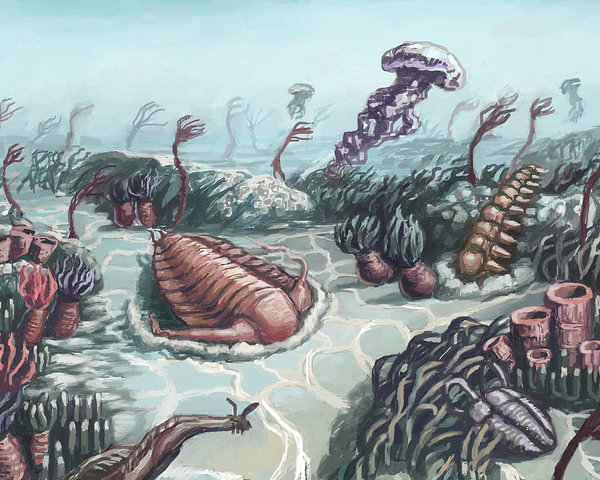Once again it was trilobites that provided the clue—in particular that seemingly mystifying appearance of different types of trilobite in widely scattered locations around the globe, all at more or less the same time.
又是三叶虫提供了线索——尤其是,不同种类的三叶虫似乎神秘地散布在全球的广大地区,而且差不多在同一时期出现。
On the face of it, the sudden appearance of lots of fully formed but varied creatures would seem to enhance the miraculousness of the Cambrian outburst, but in fact it did the opposite. It is one thing to have one well-formed creature like a trilobite burst forth in isolation—that really is a wonder—but to have many of them, all distinct but clearly related, turning up simultaneously in the fossil record in places as far apart as China and New York clearly suggests that we are missing a big part of their history. There could be no stronger evidence that they simply had to have a forebear—some grandfather species that started the line in a much earlier past.
表面看来,大量完全成形而又多种多样的动物的突然出现,似乎能增加寒武纪大爆发的奇妙程度,实际上恰恰相反。一种完全成形的动物,比如三叶虫,突然孤立地出现是一回事——这确实是个奇迹,但许多动物在相隔万里的中国和美国纽约的化石记录中同时出现,显然表明我们缺少它们的一大部分历史。这是最强有力的证明,表明它们必定有个祖先——某个老祖宗物种,它在早得多的过去开创了那个家系。

And the reason we haven't found these earlier species, it is now thought, is that they were too tiny to be preserved. Says Fortey: "It isn't necessary to be big to be a perfectly functioning, complex organism. The sea swarms with tiny arthropods today that have left no fossil record." He cites the little copepod, which numbers in the trillions in modern seas and clusters in shoals large enough to turn vast areas of the ocean black, and yet our total knowledge of its ancestry is a single specimen found in the body of an ancient fossilized fish.
现在认为,我们之所以没有发现那些早先的物种,是因为它们太小,无法保存下来。福泰说:“机能俱全的复杂动物不一定个儿很大。今天,海洋里充满着微小的节肢动物,它们没有留下化石记录。”他以小小的桡足动物为例,在现代海洋里数以万亿计,群集在浅滩上,它们多得足以使大片海域变黑,而我们对其祖先的全部了解只有一个标本,那是在一条古老的变成了化石的鱼肚子里找到的。
来源:可可英语 http://www.kekenet.com/Article/201811/569875.shtml











